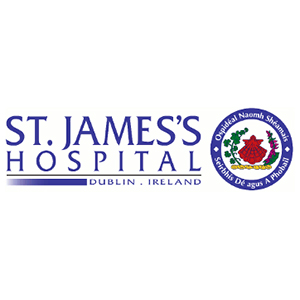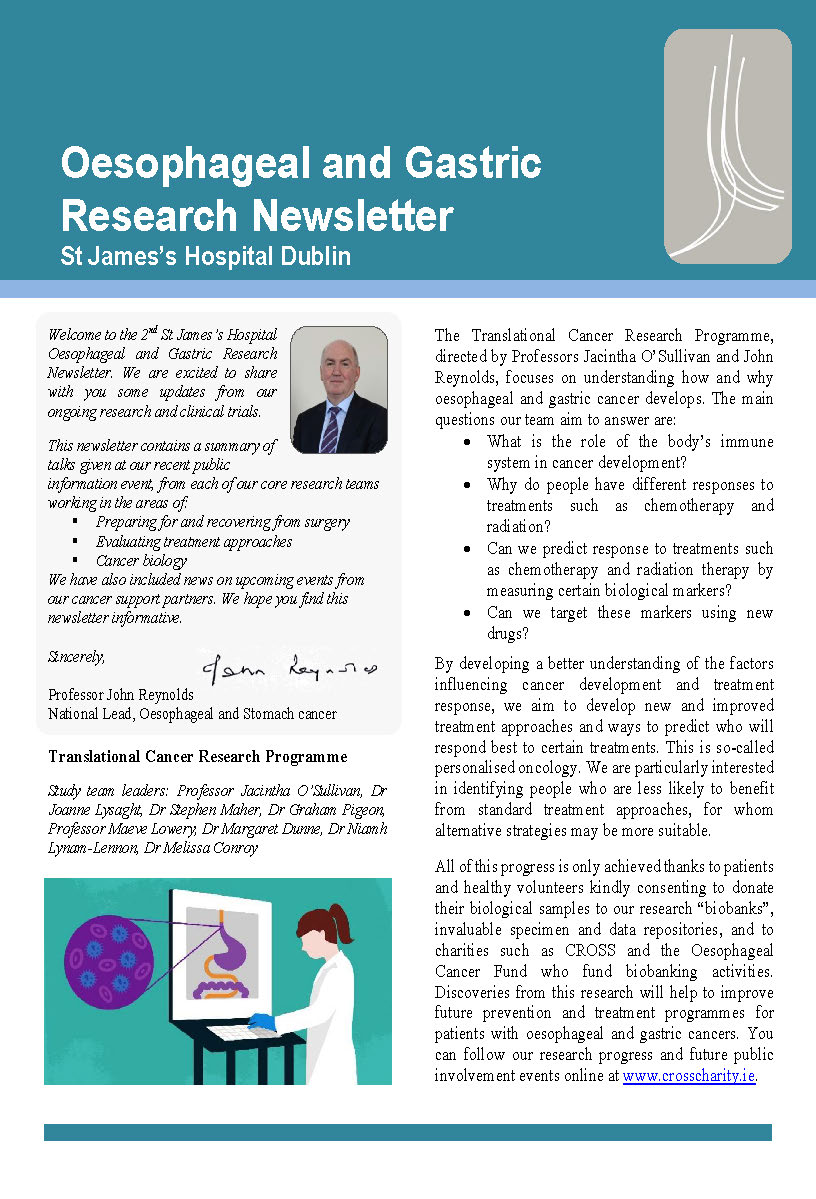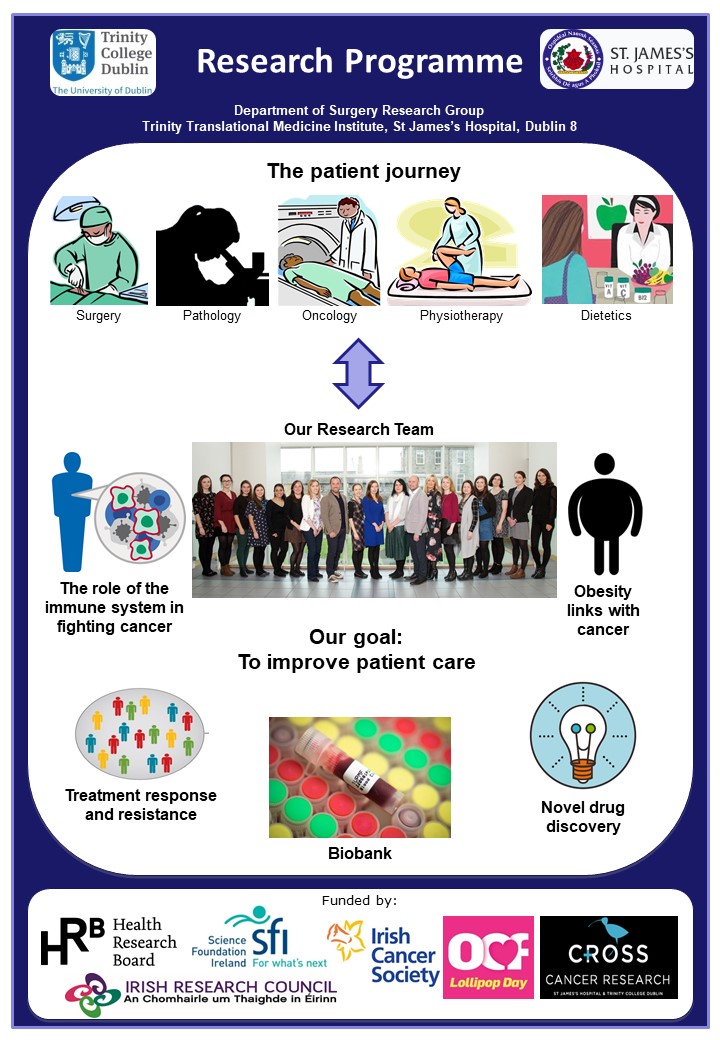Patient Information
Patient Information
In July 2017 Trinity College Dublin and St James’s Hospital welcomed the announcement of their major role in the National Cancer Strategy through the development of the Trinity St James’s Cancer Institute, a new comprehensive cancer centre on the grounds of St. James’s Hospital. The aim of the Institute is to set national standards in cancer care through the provision of research led diagnosis and treatment. It will incorporate a multidisciplinary team of clinicians, scientists and other healthcare professionals to develop our understanding of cancer prevention, treatment and survivorship to improve patient care and outcome.
Further details on the Trinity St. James’s Cancer Institute and information on various cancer types can be found at the St James’s Hospital website: www.stjames.ie/cancer
Frequently Asked Questions
Is oesophageal cancer hereditary?
No, the majority of Barrett’s oesophagus and oesophageal cancer cases arise sporadically. This may be as a result of long-term damage to the oesophagus caused by gastroesophageal reflux disease (GORD) or tobacco, and diet and obesity may be relevant, but it is not as a result of a defined genetic abnormality. Only small number of cases (approximately 7%) are thought to be linked with genetics. Overall, no specific genetic predisposition has been identified for oesophageal cancer, so it is very unlikely you can pass it on to family members. Most oesophageal cancer like cancer in general is just bad luck.
How is the 5-year overall survival rate calculated?
The five-year survival rate is the percentage of people still alive five years after their diagnosis. This percentage is calculated based on the survival times of many cancer patients, with all stages grouped together. It does not take into account whether the patient has become cancer-free (in remission) or if the cancer still remains. Your doctor will be able to give you more specific information based on your cancer stage and your individual health background.
What causes weight loss in cancer?
Cachexia (extreme weight loss) is characterised by involuntary muscle loss. Many patients, particularly those with gastrointestinal cancers, have reduced food intake which contributes to weight and muscle loss. However, cachexia is a complex condition and is not caused by reduced food intake alone, and we are only starting to understand what factors control it. Chronic inflammation and altered metabolism are also noted in cachexia, which themselves have multiple driving factors. Abnormal levels of several inflammatory and muscle proteins have been identified in cancer patients with cachexia and it is believed that these proteins contribute to the condition. Research is ongoing to explain the exact role of these factors in the progression of cachexia. Visit this website for more information on weight loss: www.ocf.ie/dietandnutrition
Can muscle loss be reversed?
Yes, certainly in most but not all patients. It is possible to manage muscle loss and ideally interventions should start as early as possible. Such interventions would include treating the symptoms that are reducing food intake e.g. administering an appetite stimulant or increasing caloric intake, or starting exercise interventions. However, a big challenge in the management of muscle loss is reliably detecting it. Currently, muscle loss can only be diagnosed by PET/CT scans. New tests are urgently needed to facilitate monitoring and earlier diagnosis of cachexia. This will allow for greater success in managing cachexia and preventing its progression.
How can I put on weight?
Gaining weight after an oesophagectomy is normally challenging for many patients. Weight gain can be difficult because you may not be able to eat the same amount of food after your surgery, and the way your body takes nutrients from the food you do eat may be less efficient. The focus after surgery is usually to help patients maintain the weight they have. If patients are obese then it is reasonable to allow some weight loss and maintain a healthy weight based on muscle mass. Visit this website for more information on high calorie diets: www.breakthroughcancerresearch.ie/books-new/
Why do I feel tired immediately after eating?
It is normal to feel a little tired after eating, due to our body increasing blood flow towards the digestive system and reducing blood flow to muscles. This makes digestion more efficient, so our body temporarily slows down some of its other functions while it breaks down the food we’ve eaten. If you’ve had an oesophagectomy and you feel tired after eating, but do not experience any other symptoms (such as nausea, dizziness, or sweating), it is very likely that the reason for your tiredness is the one explained above. However, your tiredness is much greater because with an oesophagectomy, your body must work much harder to cope with the food that you’ve eaten. So, it’s normal to feel more tired and tired for longer after eating. Speak with your doctor if you have concerns, or if you experience any unusual changes in the amount of tiredness you feel after eating.
Do patients need to volunteer for clinical trials?
Teams involved in recruiting patients to clinical trials try to ensure that all possible eligible patients are approached to consider becoming involved. However, your doctor will always welcome any questions you have regarding clinical trials and will consider your suitability depending on your cancer type, stage, health history and previous treatment. Not all patients are eligible for available trials. If you are eligible, you may choose not to participate, and this will not affect your future care. For more information, see: www.cancertrials.ie or call Cancer Nurseline Freephone 1800 200 700.

Trinity St James Cancer Institute
Please click the button below to go to the Trinity St James Cancer Institute Website.

Oesophageal Research Newsletter
Please click the button below to download our Oesophageal Research Newsletter

Patient Journey
Please click the button below to download a patient journey diagram pdf by Dr Margaret Dunne
